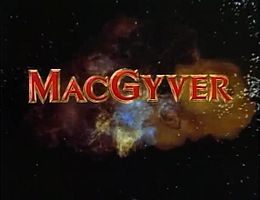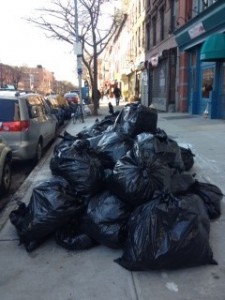Applying MacGyver Principles to Recycling Policy

 23 cm of string. 1 tyre iron. 3 broken shards of glass. 18 rolls of fiber insulation. 1 match. 2 cardboard boxes. 4 paperclips. Because you always need a paperclip.
23 cm of string. 1 tyre iron. 3 broken shards of glass. 18 rolls of fiber insulation. 1 match. 2 cardboard boxes. 4 paperclips. Because you always need a paperclip.
There was a fantastic TV show that aired in the United States when my brother and I were growing up in the late 1980s…MacGyver. No doubt many of you are aware of it as well as it aired across the globe – Australia, Europe, Taiwan, etc. It was my brother’s favourite show and I think it actually played quite a role in his ability to fix anything. Anything. If my computer breaks down I call him first.
The articles mentioned above, the tire iron, broken glass and paperclips, cardboard boxes, may all sound like rubbish cast aside, items you’d find lying in the gutter on the streets of Manhattan or in a landfill. Should we simply leave these items lie there? Or, should we try to reclaim them? Putting them to some use to help us find a way out of our trash/recycling problem? How do we get to sustainability? Is it a farce? Does sustainability actually exist?
We just had Earth Day. And remember World Water Day was not that long ago. Has the world changed? How many people drastically altered their consumption habits because of some message they read or heard on either of those days? Or were the same cheerleaders leading the chant for the home team that never quite seems to be able to score?
How many people work in offices in the US – around the world? Let me tell you a story about my office. We have black colored trash bins for trash and blue colored bins for recyclables – paper, plastic, aluminum. I dutifully sort the refuse of my consumption day in and day out, as I do at home. Even though I know for a fact that the janitor combines both bins into his large trash can as he makes his way through the offices and workstations collecting those daily discarded items. On Earth Day, all the employees in my 36-story office building received a paper postcard informing us of how we could “redeem” this card and have a tree planted. Paper postcard. Tree sapling. Printing and production process of that 3×5 postcard. 36 floors of workers. You do the math. One of my coworkers actually tried to redeem the postcard for her tree planting honor. They were out of trees. I have emailed the Director of Sustainability for our building’s management company, but have yet to hear a response.

And living in a city such as NY (take a look at the photo I snapped on trash days), I often question whether my trash and recycling are indeed separated. And I’ve questioned why can’t the city compost our food scraps? The answer I received from the city is that it is not financially administrable. It would cost too much. I’m tired of hearing this answer. I’ve travelled a bit in my day; other cities seem to have figured it out. Have they found their MacGyver solution? Have they found a way to reduce, reuse, and recycle to get themselves out from under their solid waste problem? We need to take it upon ourselves to be our own MacGyver. Before you throw something out, think if you could it once, twice more. Or if you even need to purchase it in the first place.
We, as global citizens, need to solve this solid waste problem. It’s overflowing our landfills, entering our rivers and stream, entering our precious life-sustaining oceans. If you haven’t heard of the Great North Pacific Garbage Patch, read Captain Charles Moore’s book, Plastic Ocean. And then follow it up with Sylvia Earle’s The World is Blue. If those two books don’t make you change one thing about your personal consumption habits, then the world is in trouble. Industry needs to change practice and learn what sustainability actually means and how to do it. That is my MacGyver mission. Because I don’t know about you, but I enjoy the beach and ocean. I enjoy being able to walk down a path and not see cigarettes, soda cans and chewing gum. I want to see a forest of old growth trees and not a row of saplings. I want to see fields of wheat and alfalfa and tell my kids that this is how food production began and not hydroponically in glass cases on top of buildings in Brooklyn. That’s not the future I want. Sorry to sound preachy folks, but every day is Earth Day. So if recycling really hasn’t been your cup of tea, try applying some of MacGyver’s principles and see if you can’t build a hang glider (like MacGyver would) out of your week’s trash. And we can escape this rubbish problem.
Some companies do place an emphasis on sustainability and I would be remiss not to mention those that have made an effort in committing themselves to engage in sustainable practices. You can have a look at the 100 most sustainable companies from 2012 here:
100 Most Sustainable Corporations – 2012 List
 Follow
Follow
This is a wonderful blog entry. Thank you.
Worth a nod (I hope): Richard Dean Anderson, the titular star of MacGyver, is now on the boards of Waterkeepers and Sea Shepherds, and does a lot of fund-raising for both organisations. It turns out that he’s a hardcore environmentalist in real life, too.